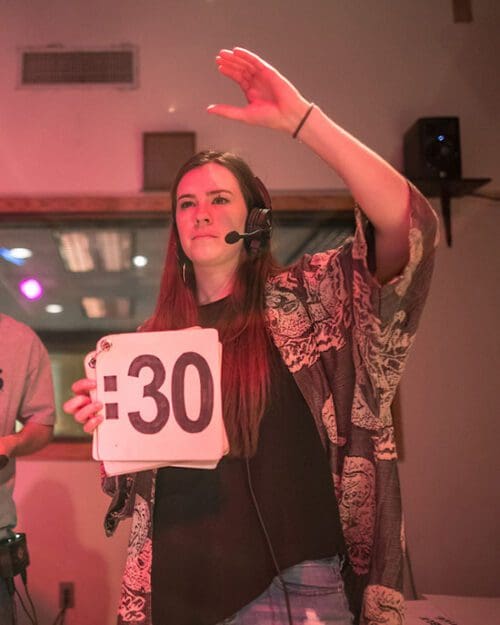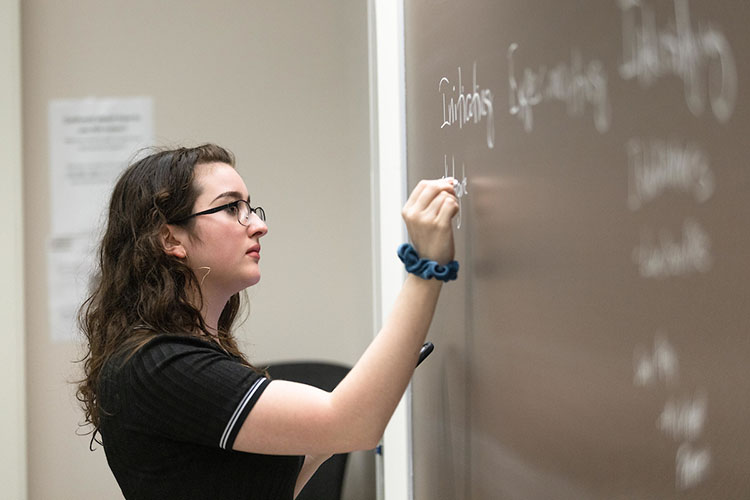What Can I Do With a Communication Degree?

We spend our days communicating, whether talking, texting or just judging the moods of the person next to us from their body language.
But what does it mean to study communication in college?
Studying Communication and Creative Arts at Purdue University Northwest (PNW) will provide you with foundational skills in shaping and delivering messages, opening doors to a range of professional opportunities.
Taking a deep dive into how and why we communicate and what it means across different contexts is valuable to successfully navigating the world — not just in Communication-specific roles but in your daily life and across many other career fields.
Learn how studying Communication at PNW elevates your academic and career goals!

Are Communication Majors in Demand?
Well-composed, effective and meaningful communication is necessary for a successful workplace. Research by the National Association of Colleges and Employers shows that 50% of surveyed employers seek candidates with quality written communication skills, and close to half want those with effective verbal communication skills, too. The flexibility of these skills can help you transition into various roles.
Data from the American Academy of Arts and Sciences shows that Communication consistently ranks as the most popular Humanities-type degree — over 25% of undergraduate diplomas earned nationally. That translates into a sizable chunk of the American workforce — over 2.7 million employees have a Communication background, according to the U.S. Bureau of Labor Statistics.
A quality, job-ready communicator will be someone who cares about how they craft messages and considers the potential consequences of their work. They approach their work from their audience’s perspective, considering what will most effectively motivate whatever group they are trying to reach.
What Are Potential Careers in Communication?
Earning a bachelor’s degree in Communication will prepare you for a successful career in a field you enjoy. Some examples include:
Professionals in these fields rely on strategic communication skills to inform consumers, attract customers and build brand awareness. Organizations value the creativity of communication professionals in shaping messages to influence target audiences.
These workers spend time crafting marketing messages, implementing campaigns or consulting on best practices for strategic communication. You can complement this career choice with a major or minor in Marketing.
Communication majors have the skills needed to write articles or scripts, frame and set up audio or visual equipment, and report or publish content to audiences. Media production professionals find jobs in entertainment and news media organizations that produce content for mass audiences.
Production types can include feature films, documentaries, television shows, radio programs and podcasts, to name a few. Mass media can also lead to jobs in media research, UX/UI design, creative design research, as well as content, product and user testing.
Communication graduates are also often qualified to transition into Human Resources roles. These professionals are responsible for onboarding new employees, updating and maintaining company training and safety manuals, and sharing benefits information.
These roles can be enhanced when paired with a Business or Human Resources Management-specific major or minor.
Professionals in these fields need the ability to write and distribute persuasive messages.
Whether you are running a campaign for public office, lobbying legislators, or consulting, communication majors can help write and distribute persuasive messages. These can include drafting bills and legislation, fundraising, conducting research or speechwriting.
Communication graduates gain skills in persuasion, public appeals and public advocacy, which opens doors for professions in environmental, women’s, labor and community organizations.
Public advocacy also prepares graduates for other political campaigns, non-governmental organization (NGO) positions and careers in public service.
There are more than 100,000 high-paying positions in community, public service and non-profit organizations and agencies.
Although many communication roles focus on external communication, companies also value what workers can contribute to internal communication.
Larger organizations, in particular, often employ a communication professional to craft and share key messages to keep employees informed about company culture, new directions for growth, employee benefits, etc.
Graduates with strong writing and communication skills can find roles as social media managers, newsletter editors, website content specialists and more.
What Communications Specialties Does PNW Offer?
As a Communication and Creative Arts student at Purdue University Northwest, you will grow critical thinking skills that help you significantly improve your composition of messages.
Core concentrations available for this path of study include:

What Does it Mean to Study Communication?
We all have different ways to communicate physically — voices, keyboards and screens, sign language, visuals and graphics, videos, and many more. But what does it mean to use a particular medium and effectively communicate?
Communication academics have studied this question for millennia, with the ancient Greeks and Romans being among the first to debate and discuss language and its delivery seriously.
The Communication and Creative Arts path of study applies communication knowledge in different contexts, including but not limited to:
- Mass communication — Communication in large-scale contexts, such as news, social media, entertainment, and popular culture.
- Public relations — Communication shaped through strategic planning that shares an organization’s messages with the intent to influence internal and external audiences.
- Visual communication — Communication that focuses on the messages we experience through photography, television, film and graphic design.
- Rhetoric — Communication particularly crafted for persuasion or social change and its effects.
- Semiotics — Communication concerned with the meanings associated with signs and symbols.
- Interpersonal communication — Communication behaviors and emotions experienced in couples or small group settings, and the impact on specifically personal relationships.
What Else Can I Do With Communication Courses?
By completing a major, minor, or general communication courses, students earn skills that transition well into other areas of study. Examples include Behavioral Sciences, Business, Counseling, Education, Health, Law, Medicine, Political Science, Psychology and Sociology.
Communication coursework provides skills in critical thinking and a good understanding of emotion and empathy, all of which employers value.

Communication at PNW
PNW’s Communication Studies and Creative Arts department offers a variety of undergraduate and graduate programs. Whether you are looking to major or minor, there is a program for you!